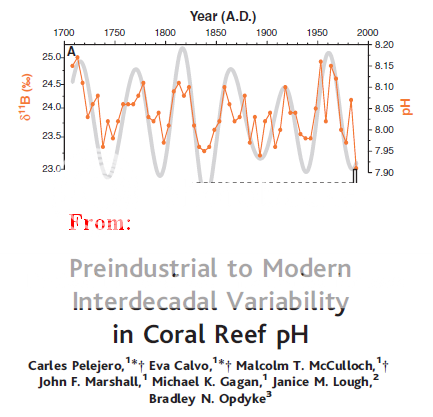Yet when I
read the 2005 paper your partial graphic refers to, (the full Fig 2 image from the paper shows several panels and explanatory text), the data in that panel is
only to 1988 -almost
30 years ago. Even so, the authors themselves state:
"Since the beginning of the industrial revolution, the burning of fossil fuels has increased the CO2 content of the atmosphere from ~280 to more than 370 parts per million per volume (ppmv), a level unprecedented in the last 420,000 years (1). To date, a large part of anthropogenic CO2 emissions has been absorbed by the oceans (2), which have become more acidic, thus reducing their capacity to continue to absorb CO2. Estimates of global oceanic pH trends to the year 2000 indicate that the oceans have already acidified by 0.1 pH units relative to preindustrial times (3, 4)."
"Geochemical models forecast an exponential decrease of nearly 0.8 pH units by 2300 (4), a scenario for which there is no obvious precedent over the last hundreds of millions of years (5), with the possible exception of abrupt changes such as those associated with the Paleocene/Eocene Thermal Maximum 55.5 million years ago (6). Experimental evidence indicates that such reductions in surface-ocean pH and carbonate saturation state could have major effects on calcifying marine biota (7), especially calcareous plankton (8) and coral reef communities, where the degree of carbonate supersaturation has been shown to have a major effect on calcification rates (9-11). "
Of more interest to me is this statement:
"The secular decrease in coral δ^sup 13^C can be ascribed to the Suess effect, which is due to uptake by the oceans of atmospheric CO2 that has been progressively depleted in ^sup 13^C by combustion of fossil fuels." . Attribution evidence that it's from human combustion of fossil fuels and is not 'natural'.
I'm not sure why you would choose that older 2005 paper and ignore the hundreds of more recent studies with more up-to-date data? Where did you get that graphic? It's not directly from the paper itself and looks like something found on a blog.
This is a Google Scholar search just for papers published since 2013:
ocean acidification - Google Scholar



